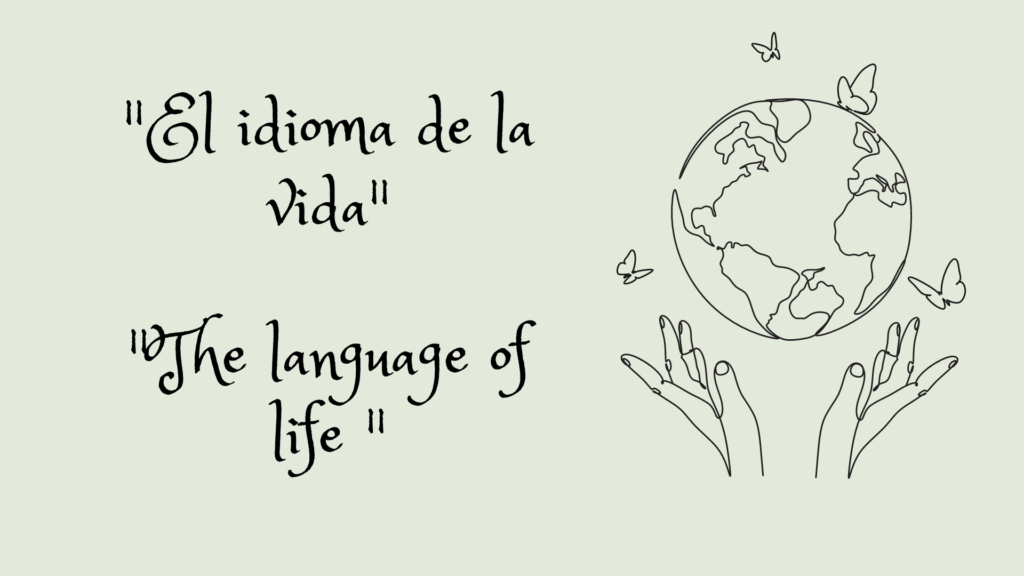“EL IDIOMA DE LA VIDA”

(Para leer la versión original en español, deslizar hacia abajo)
Some years ago the Colombian writer Fernando Vallejo said “The language of life” and is there not something more alive than language? I wonder. That innate way of communication that we learn without remembering how or when. Those first linguistic steps that bring us closer to love, to trust, to the warmth of the verbal embrace those first moments with the word give us; everyone must have an unconscious memory of the mother tongue, of the first sounds that became language.
I speak the language of Cervantes, García Márquez, Gabriela Mistral, Roberto Bolaño and Jorge Luis Borges; I speak the language that one day arrived on a ship and settled in the territories of a wounded Latin America, that today shares the same language. This language of ours, which brings us closer and distances us, in the colloquial senses that give us the very flavor of the word. That which divides us into accents and allows us to recognize each other as the same: Spanish speakers. It is still hard for me to accept that as an immigrant in northern lands, I carried on my back the incessant suffering of not being able to communicate with the same eloquence, fluency and calm as normally, in a language that is strange to me and perhaps never familiar in sound, music, and joy. English, a language that I have learned through blows and frustrations, due to the very need for communication inherent in me, as in any other, and that has given me the unique opportunity to understand that there is nothing more worthwhile than putting my brain in a condition of desperation to listen, speak, write, and read. The same circumstance that allows me to see language with humility and respect, in any possible manifestation.
It is difficult to understand the reason for the shame, shyness and self-consciousness felt within many of us who emigrate to unknown places. An unknown place where we feel at a linguistic disadvantage, starting everything from scratch. Being aware of the learning process leaves as a consequence a feeling of frustration that, at the end of the day, translates into a constant learning process. Which, although it is difficult for us to see it and often assimilate it, brings us closer to the interaction and knowledge of the new world of which we are a part; a new world that is enriched by our foreign presence.
Why not see language as “Life” in the fullness of the word itself, without priority of languages, understanding that none is superior to life itself– communicate ideas, feelings, love, arguments, anger, frustration; tell a story, invent stories. Isn’t that the same thing that connects us as humanity? The Peruvian writer Mario Vargas Llosa said in his acceptance speech for the Nobel Prize for Literature:
“I have always been fascinated to imagine the uncertain circumstance in which our ancestors – still barely different from animals, the language that allowed them to communicate with one another just recently born – in caves, around fires, on nights seething with the menace of lightning bolts, thunder claps, and growling beasts, began to invent and tell stories. That was the crucial moment in our destiny, because in those circles of primitive beings held by the voice and fantasy of the storyteller, civilization began,…” (1)
Civilization continues to tell stories, through words, through language. Speaking foreign languages in distant destinations is the living history of migration and the approaching of cultural riches, as wealth we should admire, respect and accept them; Let’s start with the language, “The language of Life.”
Written and translated by Luisa P.
(Original Spanish version)
“El idioma de la vida” decía ya hace algún tiempo el escritor Colombiano Fernando Vallejo y, ¿Acaso no existe algo más vivo que la lengua? me pregunto. Aquella innata manera de comunicación que aprendemos sin recordar cómo, ni cuándo. Esos primeros pasos lingüísticos que nos acercan al amor, a la confianza, al calor del abrazo verbal que nos regalan aquellos momentos de interacción con la palabra; cada quien habrá de tener una memoria inconsciente de la lengua materna, de los primeros sonidos que se convirtieron en idioma.
Yo hablo la lengua de Cervantes, García Márquez, Gabriela Mistral, Roberto Bolaño y Jorge Luis Borges. Yo hablo el idioma que un día llegó en un barco y se instaló en los territorios de una latinoamérica herida que hoy lo comparte. Esta lengua nuestra, nos acerca y nos aleja en sentidos coloquiales, regalandonos la sabrosura de la palabra, nos divide en acentos y nos permite reconocernos entre nosotros como los mismos, hablantes del español. Aun me cuesta aceptar, que como inmigrante en tierras del norte, llevó a cuestas el sufrimiento incesante de no poder comunicarme con la misma elocuencia, fluidez y calma de siempre, en un lenguaje extraño y tal vez nunca familiar en sonido, música y disfrute. Inglés, un idioma que he aprendido a golpes y frustraciones, por la necesidad misma de la comunicación inherente en mí como en cualquier otro, el cual me ha brindado la oportunidad única de entender, que no hay nada más meritorio que poner a mi cerebro en condición de desespero por escuchar, hablar, escribir y leer; misma circunstancia que me permite ver con humildad y respeto el lenguaje, en cualquier manifestación posible.
Cuesta entender el porqué de la vergüenza, la timidez y la autoconsciencia de muchos quienes emigramos a lugares desconocidos y en donde nos sentimos en condición de desventaja lingüística, empezar todo desde cero y ser conscientes del proceso de aprendizaje, deja como consecuencia una sensación de frustración diaria, al final traducida en aprendizaje constante y aunque cueste verlo y muchas veces asimilarlo, nos acerca a la interacción y al conocimiento del nuevo mundo del que formamos parte, nuevo mundo que se enriquece con nuestra presencia foránea.
Por qué no ver al idioma como “Vida” en plenitud de la palabra misma, sin prelación de lenguajes, entendiendo que ninguno es superior como la vida en sí. Comunicar ideas, sentimientos, amor, argumentos, enojo, frustración; contar una historia, inventar relatos. ¿No es acaso aquello lo mismo que nos conecta como humanidad? Ya diría el escritor peruano Mario Vargas LLosa, en su discurso de aceptación del premio Nobel de literatura:
“Siempre me ha fascinado imaginar aquella incierta circunstancia en que nuestros antepasados, apenas diferentes todavía del animal, recién nacido el lenguaje que les permitía comunicarse, empezaron, en las cavernas, en torno a las hogueras, en noches hirvientes de amenazas –rayos, truenos, gruñidos de las fieras–, a inventar historias y a contárselas. Aquel fue el momento crucial de nuestro destino, porque, en esas rondas de seres primitivos suspensos por la voz y la fantasía del contador, comenzó la civilización…” (1)
Civilización que continúa contando historias, a través de la palabra, a través de la lengua. Hablar idiomas extranjeros en lejanos destinos, es la historia viva de la migración y acercamiento de las riquezas culturales, que como riquezas, deberíamos apreciar, respetar y aceptar; empecemos entonces con “ El idioma de la Vida”
Escrito por: Luisa P.
Referencia:
(1)Discurso y traducción tomadas de: https://www.nobelprize.org/prizes/literature/2010/vargas_llosa/25185-mario-vargas-llosa-discurso-nobel/

